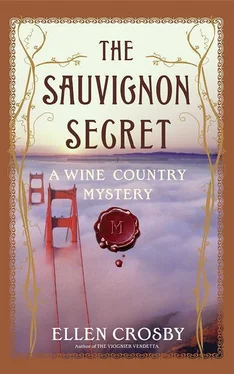“Why?” I asked.
“Mandrake was a plant that had been used as long ago as the ancient Greeks,” he said. “It’s a deliriant causing hallucinations. Used to induce sleep. It’s part of the nightshade family. The Greeks used mandrakes in war, scraping the bark and putting it in wine that they left for the enemy to discover. The foreign troops drank it and, once drugged, their captors easily overcame them. It was one of the earliest biological weapons. The name was sort of an inside joke among the five of them.”
“I’ve heard stories about mandrakes,” I said. “If you pull one out of the ground it starts screaming. Anyone who hears the sound will die.”
“I see you know your mythology,” Charles said.
“More like my Harry Potter.”
“How amusing,” he said in a dry voice. “There is another legend, a bit of folklore, that a mandrake will only grow where the semen of a hanged man has dripped to the ground.”
He steepled his fingers, and I shuddered.
“Do you mean Paul Noble?”
“I heard one of the stories about the possible cause of Paul’s death,” he said. “It is a bizarre coincidence, you must admit.”
Pépé pointed to the figure on his glass. “So this creature was the symbol of the Mandrake Society?”
Charles nodded. “Maggie had the wineglasses made for everyone. I used to have a set of six. These three are the only ones left.”
I set my glass on the coffee table with a sharp little clink. Charles stared at me.
“Do continue about this group,” Pépé said.
Charles leaned his head against the back of his chair like he was contemplating what to say. “They needed to continue field testing,” he said finally. “On humans. So they advertised for volunteers. Offering money.”
“You mean discreet ads in newspapers?” I asked. “Like they used to do before the Internet?”
“Of course not.” He sounded annoyed. “It was easy enough to find people who needed spare cash if you knew where to look … people sleeping in the rough. Homeless individuals.”
“Oh, my God,” I said. “They got people who were desperate for money to volunteer to be experimented on?”
“ It happens all the time . How else do you think they test new drugs? Don’t judge, Lucie.” Charles sat forward and shook his finger in my face. “They were protecting you . The people who volunteered were patriots. They wanted to help.”
I kept my mouth shut. Drug testing was one thing. This was about creative ways to kill people.
Charles sat back again. “There was, well, an unfortunate incident. One of the volunteers, a homeless man who said his name was Stephen Falcon, was also mildly disabled. Autistic, I guess, is how you’d describe him today. Unfortunately, he died during one of the experiments. It happened in the lab, very traumatic, upset the hell out of everyone.” He held out his hands palms up as though entreating us to understand the small setback. “There was nothing anyone could do to save him. A tragedy, obviously.”
I couldn’t tell if he meant for the Mandrake Society or for Stephen Falcon. Neither Pépé nor I spoke. Pépé’s lips were pressed together and his face was the color of ashes.
“Of course, we took care of his burial. Actually, he was cremated. We didn’t find a next of kin.” He looked rueful. “That was our undoing, where we went wrong. His real name was Stephen Falcone. He wasn’t homeless; he’d run away. At the time he was living with his sister in D.C., Elinor Falcone. She found out that he’d volunteered for our program from someone who knew Stephen and tracked us down. I went to see her.”
He gave an elaborate shrug. “I told her that her brother had died serving his country and she should be proud of him. After all, he was autistic—what kind of future could he have? She was well compensated for her loss, spared his future medical expenses, what have you. In return, of course, she couldn’t talk about what happened to him.”
Blood money. I blinked hard listening to Charles’s description of the “favor” he had done Elinor Falcone.
“Did she keep her word?” Pépé asked.
He waved a hand. “Oh, yes, she did, indeed. But it didn’t end there. Stephen’s death … I don’t know … it changed everything. The Mandrake Society got together one night at the cottage and, from what I heard, everyone got stinking drunk, really crazy out of their minds. Theo Graf, the head biochemist, said he was done with the group, the experiments, everything. He planned to quit, leave Fort Wilton and go somewhere else. Maggie was so upset that she said they ought to come clean about what really happened to Stephen. Aside from the fact that they were operating a program that shouldn’t even exist, there was the issue of what charges they might face—manslaughter, or worse. Everyone’s careers would be ruined. A tragedy when they all had such brilliant, promising futures.”
“How many ‘others’ were there?” Pépé asked.
Charles ticked them off on his fingers. “Besides Maggie and Theo there were three others,” he said. “Two men and a woman. Mel Racine, Vivian Kalman, and … Paul Noble.”
“Paul Noble was a biochemist who worked for a secret weapons program at Fort Wilton forty years ago?” I should have seen it coming, but it still floored me. “That’s a long way from owning a multimillion-dollar business distributing wine.”
Charles shook his head. “Not as far off as you think. When you consider it, there’s a lot of chemistry in wine.”
“What happened at the cottage that night?” Pépé asked. “You didn’t finish the story.”
Charles took a deep breath as if the memories still pained him. “I told you Theo left the place in a rage. Got in a car though he never should have been behind the wheel. Maggie went after him, although she was drunk, too. They were, ah, a couple, sleeping together on the quiet since fraternizing with colleagues was frowned on. Theo was crazy about her, so she figured she could talk some sense into him.” He paused and cleared his throat. “Maggie never made it off Pontiac Island and Theo didn’t know she had followed him. The car she was driving was found the next morning where she drove it off the bridge. Her body washed up on the beach.”
The writhing figures kept dancing as the fire blazed with the same intensity as when Charles had flipped the switch … how long ago? It seemed like we’d been here all night.
“Maggie’s death and the incident involving Stephen Falcone sent Theo off the deep end,” he said. “He was … I don’t know … wild, out of control. The day he came to my office for the last time—”
Charles stopped speaking and pressed his lips together.
“What happened?” Pépé asked finally.
“He made some crazy accusations. Claimed her death wasn’t an accident, and that the others had done something to tamper with the car to keep her from talking about Stephen. It was preposterous, of course. He even accused me of being part of the conspiracy.” Charles’s voice rose and his face grew flushed. At first I thought it was shame, or maybe the cumulative result of enough alcohol to float an ocean liner, but as he went on, I realized he was outraged.
“Theo swore that if he ever found a way to prove that Maggie had been murdered, he’d make sure everyone paid for it. I can still hear his voice that day,” he said. “Shouting over and over that he’d see to it each of us lost someone we loved as much as he loved Maggie. I told him he was absolutely cracked, out of his mind.”
Charles took an unsteady breath. “At the time, I dismissed it as, well, you know, an idle threat, nothing he would really act on. Besides, what was he going to uncover about Maggie’s death except the truth? She was blind drunk and she drove off a bridge in the middle of the night and drowned.”
Читать дальше












